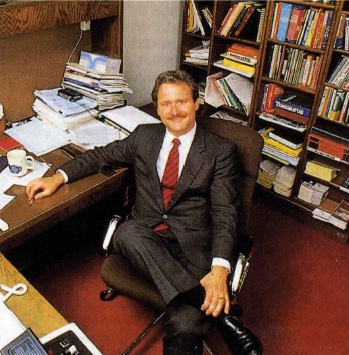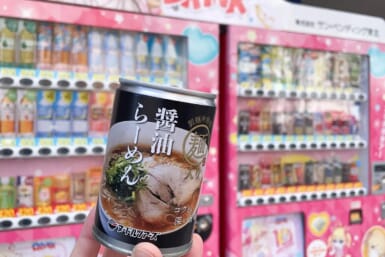by Corky Alexander
Tom Nevins was a relative youngster when he first set foot on Japanese soil. He says today that almost immediately he knew he was in the right spot for him. “I just had this feeling of being at home here,” he recalls. “It’s a feeling that hasn’t gone away over the years. This is the place I feel I should be; where I was meant to be.”
If only every foreign businessperson making his way through the inter-twining labyrinth that is Japanese society could be as well prepared for the cultural, commercial, social “shock-u” as Tom Nevins was when he first arrived here in 1972. He came here having studied Japanese, written and spoken, and, as a matter of course, has improved his language abilities almost daily since then.
Well, that was 22 years ago, and young Mr. Nevins is doing just fine, thanks. In fact, in his building in Ichibancho (technically the Ichibancho K.K. Bldg., but where Tom’s firm occupies the first, second, fourth, fifth, six and seventh floors), he recently completed an 81-person-capacity seminar room, additional training rooms and an outplacement center.
Nevins’ endeavors are a bit varied, but basically he is a personnel and motivational expert with a born salesman’s knack for cutting to the bone of a situation and spelling out quite clearly what is needed and how to accomplish the job to achieve success. “Success” is a word you hear a lot around Tom Nevins—and for good cause. He’s had plenty of it, and looks forward to much more as he gazes toward unlimited horizons.
Hailing from Westchester, New York, Thomas J. Nevins earned a B.S. at the School of Industrial and Labor Relations, Cornell University in Ithaca, N.Y., a degree he calculated would be valuable to him in a career he had already chosen. Desiring a governmental slant on his future in Japan, Nevins worked as a White House intern in Asian Affairs at the U.S. Department of State, then was assigned to another internship, this time at the Bureau of International Labor Affairs of the U.S. Department of Labor. As it turned out in Nevins’ future, these two apprenticeships at the seat of power in the U.S were to prove invaluable to him once he reached Japan and began to establish his bona fides.
Buttressing his claim to expertise in his role as labor relations expert, he began his Japan career in 1972 as a researcher with Cornell and the Japan Institute of Labor (the research organ of Japan’s Ministry of Labor.) Before establishing his own firm—Technics in Management Transfer, Inc., known familiarly as “TMT”—in 1978, he also worked as a contract consultant to a number of companies and Japanese labor unions.
In 1978, he established Technics Management Transfer Inc., just six years after first settling in Japan.
The term “headhunter” does not accurately describe the services that TMT provides, although with 20 Executive Search Consultants, TMT has placed at least one manager in 296 foreign capitalized firms, as of the first of this year. More than 50 in one firm, 40 in another and over 20 in several more. The specialty of TMT is advising firms on the rules of employment, salary systems and the most effective— arid most economically viable—methods of removing employees, replacing them or otherwise paring staff numbers without acrimony on the part of the displaced employee and without legal action becoming necessary. Nevins terms this particular service “outplacement” of employees, involving, as it does, staff reductions, cost-reduction programs, removing “problem employees” bound for “dehiring.”
Euphemisms aside, TMT has handled “outplacements” for more than 80 downsizings involving tens of thousands of employees; 20 corporate closures and 200 cases of individual designated termination cases. Tom has handled a majority of these cases personally.
Tom adds with some pride: “We accomplish this sometimes unpleasant chore for about half to one-third of the cost a firm would pay for outplacement services in the U.S. or Europe. Our outplacement consulting offers our clients my personal guarantee that they will not need a lawyer, even if someone should decide to fight in court. Our methods prevent litigation, and we can immediately end litigation if the client is already in court when we’re called in.”
Nevins’ career-long immersion in how-to-do business in Japan is the bedrock, fundamental feature of TMT’s area of expertise. Seminars, lectures and books are provided a client who might have run into a wall in attempting to conduct business here. Where Nevins finds the time to write a shelf-full of how-to books is a wonder his friends cannot explain. But he writes almost constantly, if not his book series, then articles in most major Japanese magazines and newspapers. He is a recognized expert in this field.
His published books include Passport to Japan—a Businessman’s Guide, revised each year, The Complete Handbook of U.S. Personnel and Labor Relations for Japanese Corporations (a 1980 JETRO book now out of print), Labor Pains and the Gaijin Boss and Taking Charge in Japan (Japan Times 1984 and 1990).
His three latest publications are led by Why U.S. Style Downsizing/Outplacement Is the Wrong Strategy in Japan, Striking Gold in Japan and Sixteen Steps to Corporate Leadership and Excellence (TMT’s training guide). In addition, TMT has produced a seminar video, Strategic Tools for Managing Japane Personnel—Local Practices, Policies and the Law, sold by The Japan Times.
This first-of-a-series articles in The Tokyo Weekender is hardly breaking ground for Tom Nevins: he has been interviewed and quoted in such prestigious publications as The New York Times, The Observer, Business Week, Industry Week, The Wall Street Journal, The International Herald Tribune, Fortune, plus having appeared frequently on Japanese and U.S. television panels.
If you are a businessman—Japanese or foreign— needing solid advice in any personnel or training problem, you might find it worth while to contact Mr. Thomas J. Nevins, TMT Inc., Ichiban-cho K.K. Bldg., 13-8, Ichiban-cho, Chiyoda-ku, Tokyo 102, or call him at 3261-6471 (fax 3221-0601).
What’s on the horizon for Tom Nevins and his skilled staff of business experts? “Well, we recently completed a renovations and expansion program in our building here in Ichibancho,” he says reflectively. “In these difficult times, there seems t be more of a need for our type of expertise. Unfortunately, a lot of it is concerning with ‘outplacement’ and downsizing staff, but we always try—and largely succeed—in finding employment for the ‘dehired’ worker. We’re even more proud of the way we can help these people through our training programs.”
Tom has 16-year-old and 13-year-old boys in Stateside boarding schools. Their Japanese mother, Setsuko, has always been an invaluable influence and contributor to Tom Nevins’ success in Japan.









